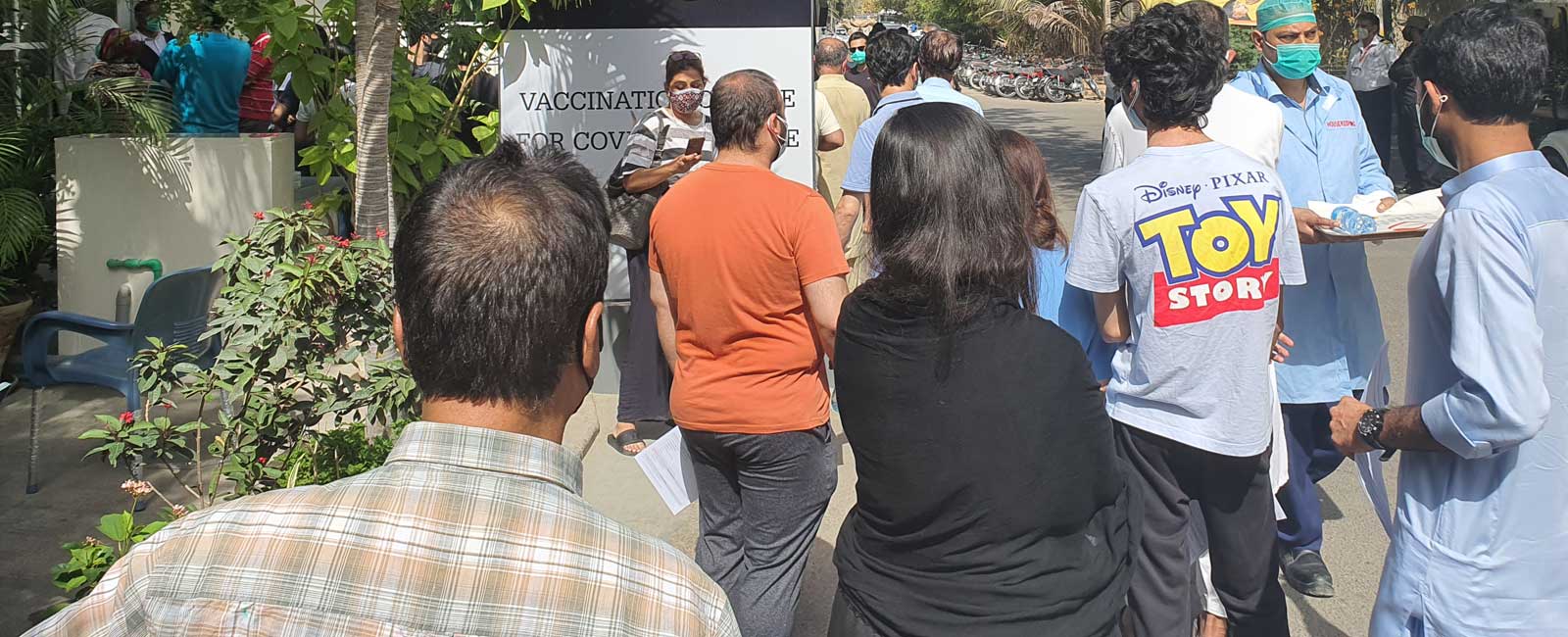I got the first dose of a coronavirus vaccine last weekend. Here’s how it went
All vaccines are safe and each protects us from severe illness, regardless of their "efficacy". We must not lose sight of the goal — protection from the virus.

As I rushed out of the car, quickly glancing at the time on my phone, and briskly walked over to the entrance of a private hospital's "Vaccination Centre for COVID-19 Vaccine", I was greeted by a long queue that had already formed on the road outside.
It was 9:55am on Saturday. Dozens of people, eager to resume some semblance of a normal life stood under the sun, water bottles and registration forms in hand. The vast majority were young, with the remainder appearing to be middle-aged.
A chat with two men in line ahead of me, one aged 59, and the other 28, revealed that they had been standing for the past 20 minutes and the line had been static ever since.
It was interesting to see that while the younger one was making use of the only option available to him, since the government is only vaccinating people aged 50 and above, the older one had been lured with the promise of Sputnik V’s “greater effectiveness”, as he put it. According to the medical journal The Lancet, Sputnik V’s efficacy was shown in trials to be 91.6% twenty-one days after the first dose.
As I walked past the line, up to the entrance doors, looking to get the registration form I had seen everyone holding, I was surprised to see that another line had also branched off from the entrance and was occupying the opposite end of the road.
Take a look: A province-wise list of coronavirus vaccination centres across Pakistan
A uniformed guard greeted me politely and pointed to two green-scrubbed doctors in the distance who were carrying a stack of papers.
They handed me a single-page, pre-vaccination evaluation checklist, along with a clipboard and pen. I was also offered a water bottle, which I gladly accepted.
I filled out basic information such as name, age, gender and CNIC number, along with checkboxes for details pertaining to my health such as whether I have any chronic illnesses or allergies, whether I had ever tested positive for COVID-19 or got vaccinated for the disease, etc.
While it barely took a minute to fill out the form, a considerable wait followed for the next few steps.
The wait
As I joined in the queue after filling out my particulars, the clock turned to 10:11am. I had already begun to feel a line of sweat trickling down my back. The mercury had risen to 34°C, with ‘real feel ‘ temperature showing as 37°C on the weather app. I could see people shielding their faces with the forms in the absence of a covered area and growing impatient. It would go on to be the hottest April day since 1947.
Read: Karachi records highest April temperature since 1947
At 10:30am, the 28-year-old in front of me got out of line to go investigate what the holdup was. Just then, a man and a woman emerged from the doors, although masked, but bearing a distinct look of triumph in their eyes.
The woman, a 35-year-old named Sundus, began excitedly chatting with a friend she greeted a few spots behind me. I asked her how the experience was and she said it went smoothly, save for a bit of time invested. She had arrived at 8:55am and had come out at 10:30am — so it took her an hour-and-a-half to be done.
By then, the 28-year-old who had pulled a disappearing act had appeared. I struck up a conversation with him about how he had found out the Russian Sputnik V vaccine was being administered at the hospital. He said he saw news tickers the evening before notifying the shot’s availability. The 59-year-old joining in the said he found out via Facebook posts, prompting me to nod and reply that I had learnt of the availability in a similar way — via Twitter.
Our conversation was cut short. The green-scrubbed doctors, along with administrative officials, began ushering away all the people from our queue.
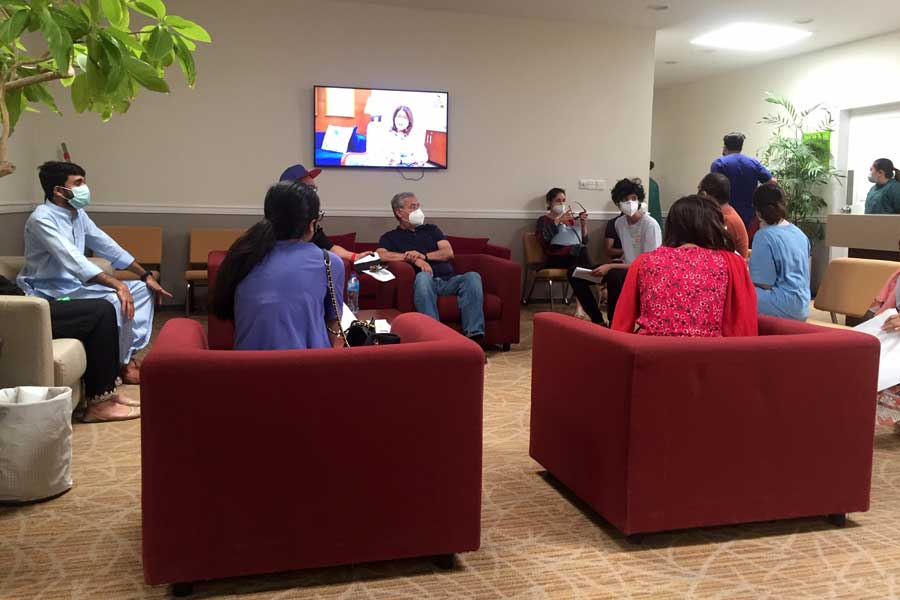
We had mercifully been rescued from the punishing heat and led indoors to a ward housing cardiology, physiotherapy and dental clinics, among others. People quickly sat down on sofas spread all over the air-conditioned waiting area.
At this point, my concern was that with the queue broken, how will the hospital staff know who came in first. I took a look at the form in my hand and discovered it was not numbered either.
Amid the many questions starting to form in my head, I spotted a staff member rushing to a counter with a laptop, and hurriedly plugging it in. It seemed they were only just beginning to arm themselves for the full onslaught of a vaccine-hungry populace.
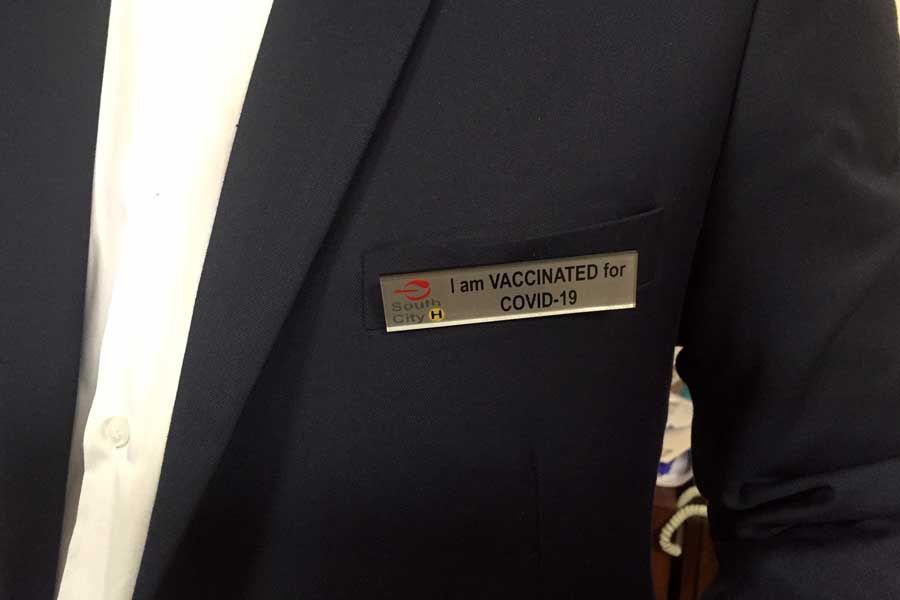
It was encouraging to see everyone religiously following safety precautions — people had even double-masked before coming in. In fact, people were so particular about maintaining safety, that a man accompanying an elderly woman could be seen handing her rubber gloves. Moreover, hospital staff were wearing badges stating that they were fully vaccinated.
As people continued to wait, without any clear communication from the hospital about what comes next, a man anxiously surveying the room said: “I am getting the distinct feeling there are more people here than there may be doses.”
Just then, a woman staffer appeared with a paper in her hand and went from person to person, jotting down their names. I was 11th in line. She did well to gauge the anxiety around the room and went about answering all the questions people put to her.
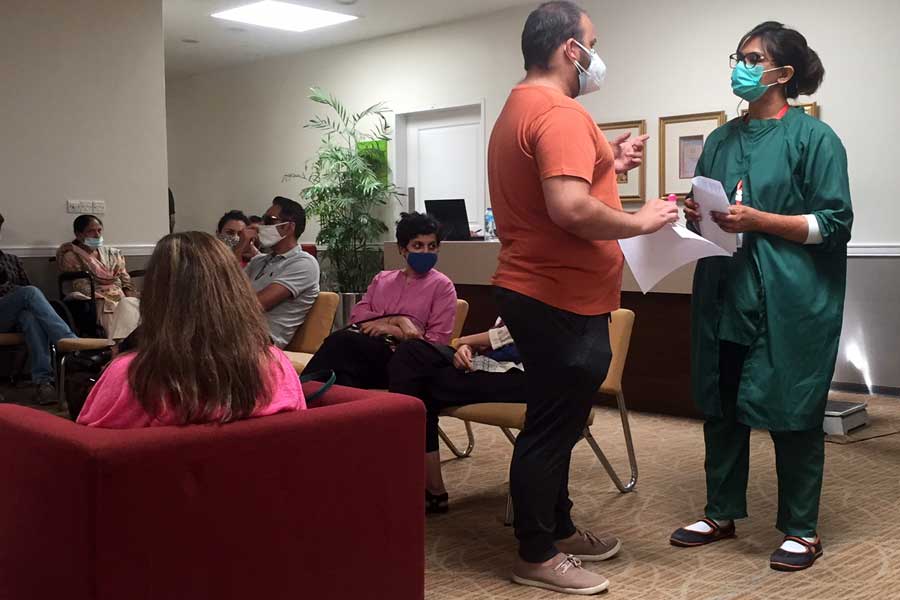
At about 10:50am, among the lot that had come in from the outside, the first person was called away to be administered the shot.
In the sea of people patiently awaiting a similar call was a father-son duo. The son, who requested anonymity, said he and his brother had come in to get their shots a night earlier and now wanted their father aged above 65 to get one too.
“I read about the vaccine in The Lancet medical journal and it seemed to be one of the better ones. Although it is expensive, quite beyond the reach of the common man, I believe anyone who can arm themselves with it, should,” he said.
When asked if he is feeling any symptoms of a reaction, he replied in the negative. “No, I am doing just fine. No adverse effects at all.”
As the room continued to fill up at a pace that seemed faster than the vaccination rate , I heard the magical words: “Sameen Daud Khan”. Finally! My name had been called out at around 11:25am.
Payment and NADRA registration
What followed was upfront payment of Rs12,268 for both doses, as set by the Sindh High Court, after which the staff said it is registering me with NADRA through the National Immunisation Management System (NIMS).
I was required at this point to produce my original Computerised National Identity Card (CNIC).
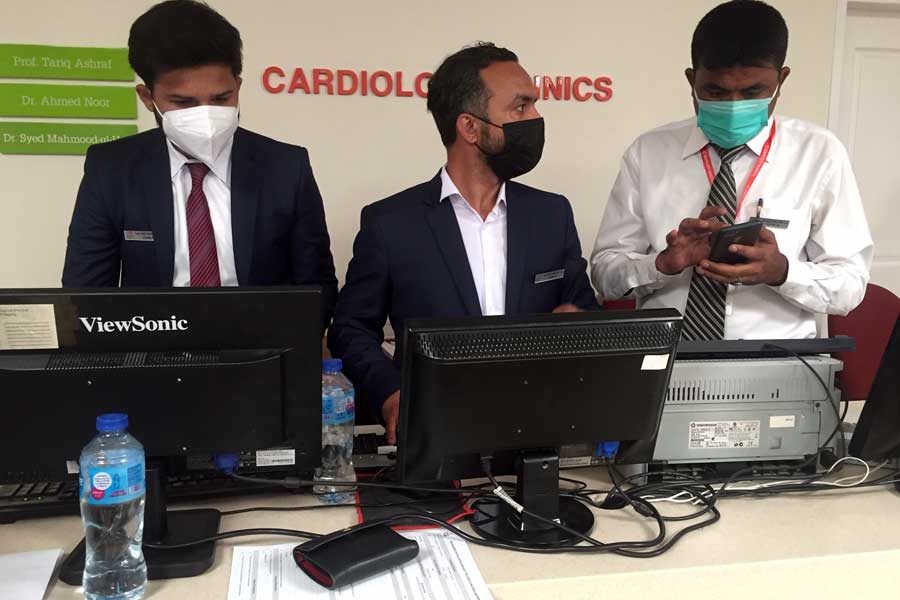
Getting the shot
After a brief wait — yes, by now the waiting should have ended — I was shown to a small doctor’s office where a physician along with two nursing staff were just getting done vaccinating a couple.
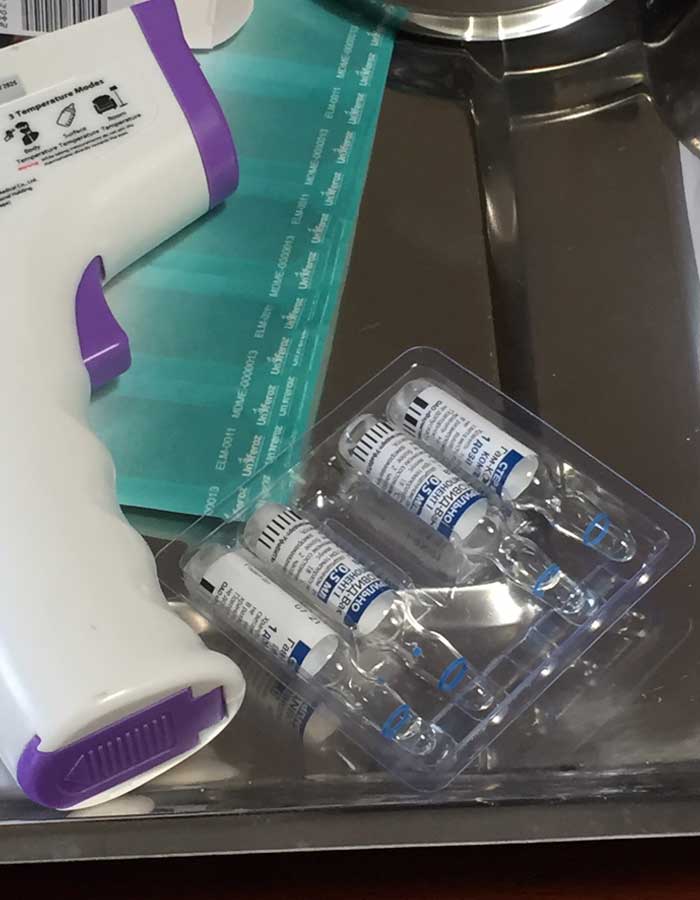
I sat down on a stainless steel stool next to the doctor, after which one of the nurses checked my blood pressure. The doctor took my form and asked me my medical history — the same questions that I had answered in the checklist earlier — and how I was feeling.
Satisfied that I could be administered the shot, she motioned for me to take a seat across her desk where a nurse was ready with a tray.
The nurse checked my temperature with a thermal gun and then proceeded to reach for the much-awaited blue-labelled ampoules with Russian characters.
After I rolled up my sleeve in preparation of the shot, she asked me to take a deep breath.
As I drew in air into my lungs, I felt it: A slight pricking, but no pain at the time of withdrawal.
It was done. I had received the first dose of a coronavirus vaccine and although it cost me a good Rs12,000 and no small amount of time (I got done at 12:30pm), I had now taken the first step towards minimising risk of hospitalisation or death from COVID-19.
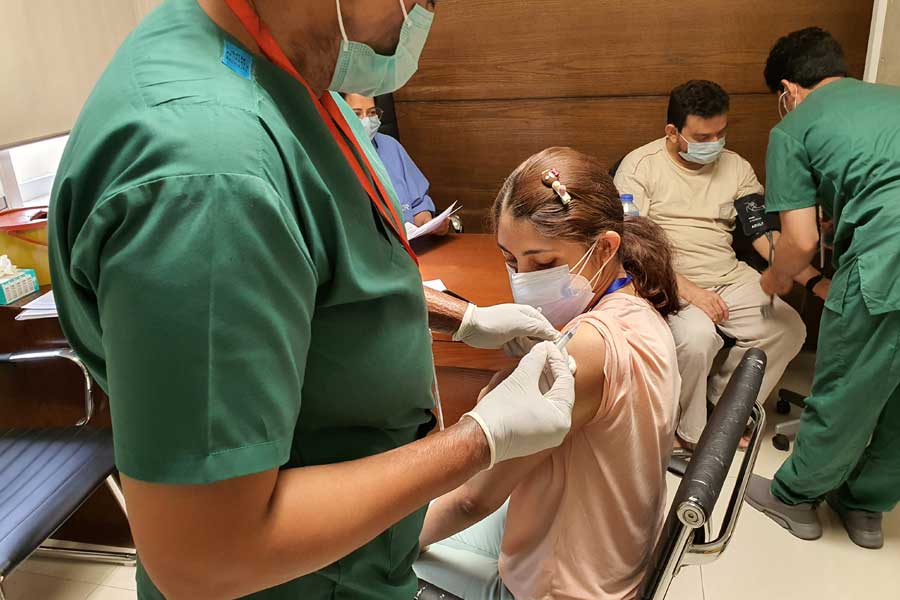
I was asked to wait for 30 minutes just in case any side effects begin to show. A vaccination card from the hospital was also given showing the date I need to come in for my second shot — exactly 21 days later.
My two cents
The primary reason I paid to get vaccinated is because I have loved ones who are immunocompromised and who have not yet been cleared by doctors to get inoculated. Barring breaking the law, it was the only way I could better the odds of not transmitting the virus to them.
Otherwise, the government’s vaccination programme is already well underway — with a million having received their jabs — and is open to those aged 50 and above, besides healthcare workers.
So those who can afford it, should not hesitate in purchasing one for their own sake and for the benefit of society at large. And those who are eligible to get one through the government’s vaccination programme, must not delay registering for a vaccine. Whether it is Sinopharm, CanSino, AstraZeneca or Sputnik V, all are safe and each one protects us from severe illness, regardless of their "efficacy". We must not lose sight of the goal at hand — protection from the virus.
Watch: What you should know about getting a coronavirus vaccine in Pakistan
As The Independent put it: “The vaccines work, they are safe, they are cutting transmission, and even against the current crop of variants, they’re capable of offering protection.”
Furthermore, the US Centers for Disease Control recommends people get them as soon as they are able.
Getting my first dose has therefore provided me immense peace of mind. And with more people getting vaccinated, the country will move towards herd immunity sooner.
I can report there were no serious adverse side effects — a factor that has let to vaccination hesitancy in many people. Although I did end up developing a fever and body aches, it was nothing that two Panadols and some sleep did not fix.
Read: Have you been vaccinated? Here are the side effects you may experience
And with the new variants that have been discovered, it makes it all the more important for us to get the jab — any jab.
You can weigh the pros and cons to getting a vaccine. But remember, as Senior Faculty Editor, Harvard Health Publishing, Robert H. Shmerling, put it: "There are also pros and cons to declining treatment. So the decision to get vaccinated against COVID-19 should be an easy one."



